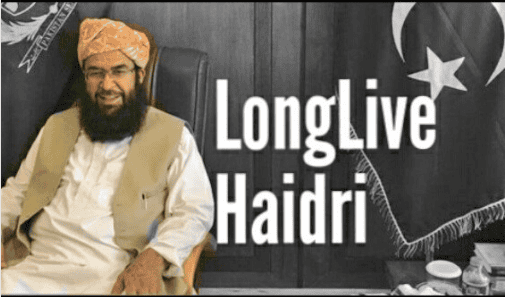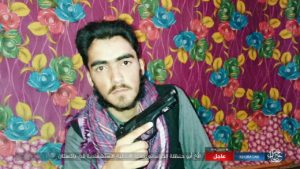
Yesterday, a suicide bomber dispatched by the Islamic State’s Wilayah Khorasan (Khorasan province) attacked a vehicle carrying Maulana Abdul Ghafoor Haideri, the deputy chairman of Pakistan’s Senate. Haideri, who is a senior figure in the Jamiatul-Ulema-e-Islam-Fazl (JUI-F), was wounded and subsequently hospitalized.
Dozens of others were killed or injured in the blast, which occurred in Mastung, a town in the Baluchistan province.
The bombing was quickly claimed online by the Islamic State’s Amaq News Agency and then in a separate statement from the group. Wilayah Khorasan also released a photo of its “martyr,” identifying him by the alias “Abu Nandalah al-Khurasani.” The picture can be seen below.

“By the grace of Allah, istishhadi [“martyr”] brother Abu Nandalah al-Khurasani (may Allah accept him) was able to detonate his explosive vest on the convoy of the murtadd [“apostate”] Abdul Ghafoor Haideri, the vice president of the taghut Pakistani Congress near Quetta City in Pakistan,” the Islamic State’s statement reads. The bombing “resulted in his injury, the killing of more than 30 murtaddin of the police, intelligence personnel and bodyguards, and the injury of more than 40 others, and all praise is due to Allah.”
The JUI-F organized an online campaign to show support for Haideri. Prominent figures, such as former Pakistani president Pervez Musharraf, have condemned the bombing. JUI-F also created an image in Haideri’s honor that supporters are using online. The image, which can be seen above, includes rough English text that reads: “LongLive Haidri.”
JUI-F is led by Fazl ur-Rehman, a member of Pakistan’s assembly and the leader of the opposition. Both he and the JUI-F have been longtime supporters of the Taliban. He is widely credited with helping to create and sustain the Afghan Taliban by training many of its members in JUI-F madrassas located in the Baluchistan province and northwestern Pakistan.
JUI-F is an ideal target for Wilayah Khorasan as it both supports the Taliban, the Islamic State’s main rival in the region, and participates in Pakistan’s government. Years before the Islamic State planted its flag in Pakistan, jihadists targeted JUI-F leader Rehman in suicide attacks.
The bombing demonstrates that while Wilayah Khorasan has suffered significant losses, especially in neighboring Afghanistan, the group is still capable of carrying out lethal operations.
Wilayah Khorasan was built by former Afghan and Pakistani Taliban commanders who defected from their organizations to swear allegiance to Abu Bakr al Baghdadi’s self-declared caliphate. This local talent provides Baghdadi’s loyalists with an indigenous network that is difficult to uproot.
Mastung is not far from Quetta, the capital of Baluchistan province, which is a hub for numerous jihadist groups. Wilayah Khorasan has carried out other operations in Quetta and elsewhere in Baluchistan over the past year. However, some of these attacks have been claimed by other jihadists, making it difficult to discern who was responsible.
For example, both the Islamic State and Tehrik-i-Taliban Pakistan Jamaat-ur-Ahrar claimed responsibility for a suicide attack at a hospital in Quetta last August. Scores were killed or wounded in that bombing, which targeted lawyers who had gathered to mourn the head of the Baluchistan Bar Association. [See FDD’s Long War Journal report: Jamaat-ul-Ahrar, Islamic State claim suicide attack at Pakistani hospital.]
The Pakistani Taliban and the Islamic State both claimed an Oct. 2016 suicide assault on a police academy in Quetta that killed at least 60 people and wounded more than 100. Pakistani officials claim still another jihadist group, Lashkar-e-Jhangvi al Alami, carried out the assault. [See FDD’s Long War Journal report: Islamic State, Pakistani Taliban claim suicide assault in Quetta.]
In addition to Pakistani officials and civilians, the Islamic State has also repeatedly targeted its jihadist rivals in the Afghan Taliban, some of whom operate in Pakistan. In mid-April, for instance, Wilayah Khorasan claimed the assassination of a prominent Taliban member in Peshawar.
For more background on the Islamic State’s Wilayah Khorasan, see FDD’s Long War Journal report: 2 American service members killed fighting Islamic State in eastern Afghanistan.








4 Comments
There are those who believe the’ martyr’ is brave to some stoopid extent, ..not I. Killing indiscriminately is not brave, nor does any of these monsters get’ praise’ from Allah,..unless of course he too is a murderous thug? What really throws it all under the bus, is that you don’t hear the amount of condemnation that should be equal to the horror. Where it said that all this was possible because of Allah…..I find it unbelievable that locals take that as a good’ ‘reason’ . Americans cannot fathom this level of disrespect for human life, I guess we care too much. But this is what we must fight if we want to scourge the land of these murderers. Good luck, my brothers in arms!
Hopefully, the USG has a calculus in which it at least temporarily exempts some of these leaders from execution as long as they are effectively attacking the leadership of other jihadist groups.
Their intelligence on their factional adversaries will invariably always be better than ours, so there needs to be a compelling reason to disrupt presumably more effective attacks upon our common enemies. Particularly for those individuals primarily based in Pakistan.
With more U.S. troops headed for that theater, that will become an increasingly artful cost-benefit assessment.
I say kill all jihadis and let Allah sort them out. No respite. Give them even more ammo if they are killing each other. Paint their holes and hideouts with Lasers and kill them in their homes and when their foreheads hit the ground… kill them in the morning and once more before bedtime. Kill them regardless of which side of the imaginary AfPak border they find themselves on. Kill them when they wear ANSF uniforms and kill them when they don’t. And don’t pretend anything they say is true!
ISIS-K seems very close to the ISI (this also says they set up AQIS, which tracks w my understanding of where Z is, Karachi ISI safe house):
“The Islamic State of Khorasan Province (ISKP) has been known to be working with the ISI, usually through the Jamaat-ud-Dawa (JuD). It has, for example, been working closely with the ISI in Nangarhar in Afghanistan, from where in an intelligence coup 22 recruits to ISKP from Kerala were discovered by agencies in India. Apparently with the connivance of GHQ Rawalpindi, the ISKP has carried out numerous attacks on religious minorities in Pakistan, focussing mainly on the Shia community. Other such attacks have been carried out by the Lashkar-e-Jhangvi, which too is known to be collaborating with the ISI in covert operations against mutually detested targets.”
http://www.sundayguardianlive.com/news/9410-ghq-terror-targets-india-us-spares-china